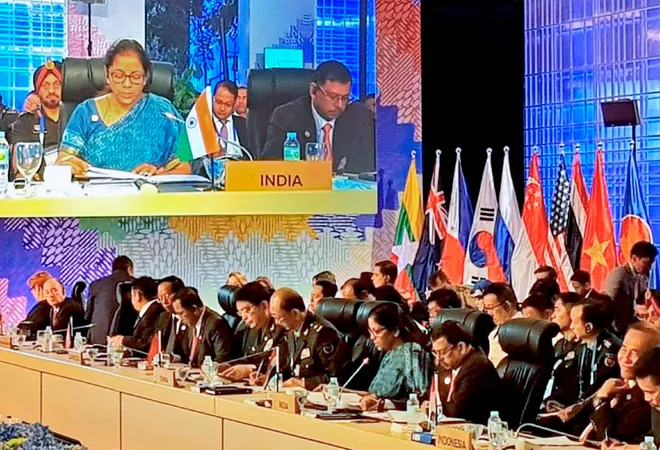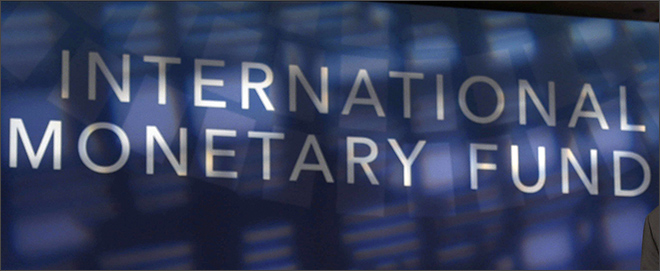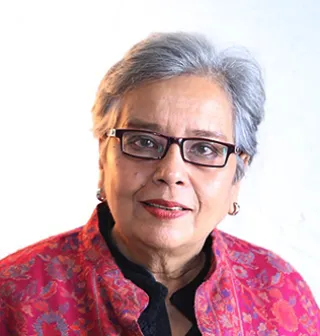-
CENTRES
Progammes & Centres
Location
The real reform of the international financial architecture can only be completed when Emerging Economies or the other half of the G20 are fully represented in the decision making and governance of the IMF.

Half of the members of G20 are highly industrialised advanced countries (US, UK, Japan, Canada, Australia, France, Germany, Russia, Italy and the EU) and the other half are Emerging Market Economies like India, China, Indonesia, Turkey, Brazil, South Africa, Mexico, South Korea, Argentina and Saudi Arabia. Ever since it was formed in 1999 as an offshoot of G7 (the rich countries' club), it has been dominated by the rich countries.
G20's primary objective and responsibility since the Global Financial Crisis (GFC) of 2008 was to safeguard and strengthen global financial stability. At the G20's Washington Summit which took place at the height of GFC in November 2008, it assumed the responsibility of strengthening the international financial architecture so that another financial crisis does not take place in the future. Every G20 meeting is preceded by a finance ministers and Central Bank governors' meeting to which the head of the International Monetary Fund (IMF) is also invited. The recent G20 meeting in Hamburg was preceded by such a meeting in Baden Baden. In the Hamburg summit, many other issues beginning with climate change, terrorism, antimicrobial resistant viruses and digital economy were added, diluting its main focus.
G20's primary objective and responsibility since the Global Financial Crisis (GFC) of 2008 was to safeguard and strengthen global financial stability.
It was decided at the G20 London summit of 2009 that the IMF would be revamped and refurbished with more funds and it would resume the role of surveillance of global money flows. In the Seoul Summit in 2010, the G20 pledged to reform the IMF in two steps. The first was doubling of quotas of member countries and second was the reform in governance of the IMF and to redistribute seats on the IMF's executive board away from Europe. The IMF became stronger as a result and along with the Financial Stability Board and Basel Committee on Bank Supervision located in Basel, Switzerland, are responsible for overseeing all global financial flows.
Since the last GFC, there has been a period of lull and slowdown in the global financial flows due to the slow growth of the world economy, but there could be a problem of volatility if US raises interest rates significantly and the FIIs rush back from Emerging Market Economies to the US. G20 is supposed to safeguard against such volatility.
At the St. Petersburg summit of G20 in 2013, members stressed that the IMF's quota reforms should take place immediately. It wanted quotas to reflect the current weight of Emerging Market Economies in the global economy. Quotas are important for each of the 189 member countries of the IMF. Each member is assigned a quota that determines its maximum financial commitment to the IMF, its voting power and has a bearing on its access to IMF financing. The current quota formula is a weighted average of the GDP (weight of 50%), openness of the economy (30%), economic variability (15%) and size of the international forex reserves (5%). GDP is measured through a blend of a country's GDP based on market exchange rates (weight of 60%) and Purchasing Power Parity exchange rates (40%).The quotas are denominated in Special Drawing Rights (SDRs) which is the IMF's unit of account.
The largest quota holder is the US with 17.7% or SDR 82.99 billion ($113 billion). India has only 2.75% quota and China 6% and that too since January 2016. Earlier quotas were much lower for both — India 2.34 and China 3.81. The recent revision happened only after the 14th review of quotas was completed in 2016 after waiting for six years since the Seoul Summit of 2010 because the US blocked any increase in quotas for the Emerging Market Economies. US has the sole veto power at the IMF. But it could not stop the Chinese Yuan from being added to the SDR currency basket along with the Yen, Euro, Pound Sterling and Dollar in 2016 due to its strength and use in international transactions.
The largest quota holder is the US with 17.7% or SDR 82.99 billion ($113 billion). India has only 2.75% quota and China 6%.
In the IMF's present quota regime, the developed (OECD) countries together possess much higher quotas (63%) than the global South and thereby they have a much greater influence on important policies and decisions of the IMF affecting global financial architecture.
In Hamburg, the G20 urged for the quick completion of the 15th General Review of Quotas which is supposed to be completed by October 2017, but now the date has been extended to 2019. The 15th review seeks changes in the governance structure of the IMF with better representation of the Emerging Economies in the Board of Governors. A new formula for granting country quotas is also expected. A lower quota means lower access to loans from the IMF.
IMF loans come with conditionality and countries are allowed to borrow for tiding over their balance of payments problems. IMF's conditionality includes cutting government expenditure and practicing austerity, devaluation, trade liberalisation, balancing budgets, removing price controls and state subsidies, privatisation, improving governance and enhancing rights of foreign investors vis-à-vis national laws. The stringent conditionality makes it difficult for developing countries to access loans.
< style="color: #ff0000">
India does not need to go to the IMF anymore because it has huge foreign exchange reserves. What it needs is infrastructure financing for which there is BRICS' Shanghai based New Development Bank. Finance Minister Arun Jaitley has revealed that India is seeking $2 billion loans from NDB whose terms and conditions will be better suited for India. Other developing countries will also be able to access loans from NDB. Regional and multilateral development banks will become more relevant for the global South in the future and the G20 has taken note of it.
The real reform of the international financial architecture can only be completed when Emerging Economies or the other half of G20 are fully represented in the decision making and governance of the IMF which remains the main pillar of the global financial system. Similarly in institutions like the Financial Stability Board and Basel Committee on Bank Supervision (BCBS) that have laid out the Basel III norms for banking (which are difficult to implement for developing countries including India), there has to be better representation of the global South. The Hamburg declaration notes that BCBS should not significantly increase the capital requirements for banks. Unless G20 enforces these changes, it will remain a rich countries' club which only talks on various issues once a year!
The views expressed above belong to the author(s). ORF research and analyses now available on Telegram! Click here to access our curated content — blogs, longforms and interviews.

Jayshree Sengupta was a Senior Fellow (Associate) with ORF's Economy and Growth Programme. Her work focuses on the Indian economy and development, regional cooperation related ...
Read More +
David Rusnok Researcher Strengthening National Climate Policy Implementation (SNAPFI) project DIW Germany
Read More +